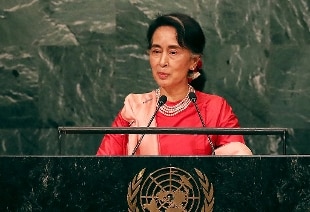Myanmar and the Rohingya flight, Aung San Suu Kyi replies to Malala: "Enough disinformation"
Myanmar and the flight of the Rohingya, Malala against Suu Kyi: just keep quiet about the repressions
The Rohingya exodus.
123,000 refugees crossed the border into Bangladesh in 10 days
Myanmar, the UN: 50,000 Rohingya fleeing violence
Myanmar, Aung San Suu Kyi accuses NGOs of cooperating with the Rohingya
Share
13 September 2017
Myanmar's de facto leader Aung San Suu Kyi will not be present at the UN General Assembly scheduled for next week.
Government spokesman Zaw Htay announced this, without providing further details.
The Nobel Peace Prize winner, who last month during his first official speech at the UN tribune had addressed the delicate issue linked to the condition of the Muslim Rohingya minority, in the last month was harshly criticized by the international community for its management of the crisis in the state of Rakhine.
According to United Nations estimates, about 370,000 Rohingya Muslims have had to leave their villages and return to Bangladesh due to the violent repression of the Burmese military, which began in late August and live in great precariousness.
A situation that the UN High Commissioner for Human Rights Zeid Raad al-Hussein denounced as "textbook ethnic cleansing".
Aung San Suu kyi: "It's just disinformation"
Aung San Suu Kyi, in a phone call with the Turkish President Erdogan in recent days had denounced the "disinformation" on the Rohingya crisis.
The 'Lady', as she is known by the Burmese, had spoken of a "heavy iceberg of disinformation", which deforms the story of what is happening.
"This kind of false information is only the most visible part of a huge iceberg of disinformation," said San Suu Kyi.
The persecuted minority
The Rohingya are a Muslim minority living in Rakhine State whose repression is raising international criticism and appeals from Nobel laureates, 'colleagues' of Aung San Suu Kyi, whose silence has attracted many perplexities.
Some Indonesian human rights activists, the most populous Muslim country in the world, have even invited the Nobel Committee to collect the award for the Burmese leader.
Speaking for the first time about the crisis with a statement released by her office, last August 25, Aung San Suu Kyi said that the 'fake news' were put around artfully to "create a lot of problems between the different communities" and to promote "the interest of terrorists".
Malala's indictment
The
loudest
voice that has been raised against the Burmese leader is that of another Nobel Peace Prize winner.
Pakistani and Muslim activist Malala Yousafzai had in fact harshly criticized the 'colleague' for ignoring the 'ethnic cleansing' taking place against the Muslim minority in the Rohingya, which has forced 125,000 people to flee to Bangladesh in the last 10 days.
"Every time I read the news my heart breaks for the suffering of the Rohingya Muslims in Myanmar," said Malala, who miraculously survived an assassination attempt by the local Taliban in Pakistan when she was only 15 years old in 2012 and fought for some female education.
"Over the past few years I have repeatedly condemned this tragic and shameful treatment. I am still waiting for my fellow Nobel laureate Aung San Suu Kyi to do the same", denounced Malala, who won the Nobel Peace Prize in 2014. Suu Kyi , Nobel Peace Prize winner in 1991, who spent over 20 years isolated in her home by the military junta, has been Minister of Foreign Affairs and Councilor of State since 2016 (a position created especially for her) who places her in practice, always with the placet of the generals, leading the state.
But Suu Kyi, a Buddhist, does not want to antagonize the support of the majority of the Burmese population who hate Muslims.

